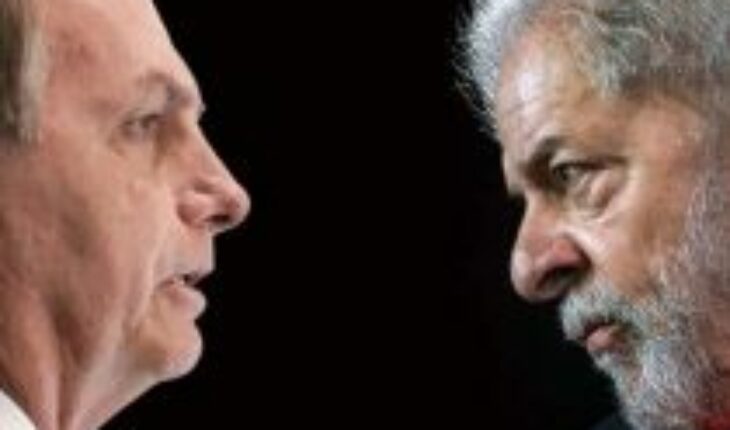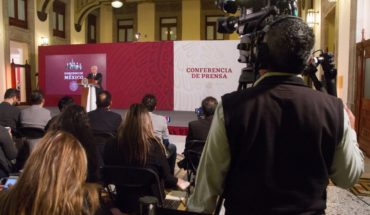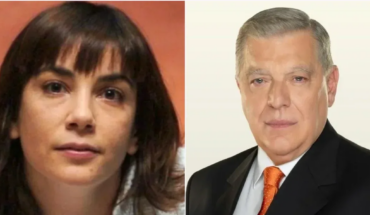With an intense crossfire between the two main candidates in the midst of an electoral campaign full of accusations, high tension and polarized as it did not happen decades ago, with clashes and a dead citizen, Brazil is on the verge of a presidential election that is looming of uncertain outcome.
Although next Sunday, October 2, twelve candidates will compete to reach the Planalto Palace, the contest will be focused on only two of them, the former leftist President Luiz Inácio Lula da Silva (76) years old), former union leader and current leader of the Workers’ Party (PT), and the current Head of State, the far-right and retired military Jair Bolsonaro (67).
Most polls predict a triumph of the PT leader even in the first round, but recently studies have appeared that indicate that there is an approach of the President in the intention to vote. Thus, for example, the latest Datafolha poll indicated that Lula maintains 45% support and that Bolsonaro rose from 32% to 34%, that is, he reduced the lead to 11 percentage points. However, a consultation carried out by Paraná Pesquisas yields an eventual technical tie. This gives Lula da Silva a vote intention of 40.2% in the first round compared to 36.4% of the current President, who comes from the Liberal Party. Based on the margin of error of 2.2 percentage points, the candidates are technically tied.
Datafolha ranks third to Ciro Gomes, of the Democratic Labor Party (PDT), with 7%, and fourth to Simone Tebet, of the Democratic Movement of Brazil (MDB), with 4%, and with few options to rise significantly. If none of the candidates gathers more than 50% of the votes on October 2, a second round will be held between the two most voted on October 30.
In addition to electing Head of State for the next 4 years, the governors of the 26 states of the Federation and the Federal District will be voted. The 513 seats of the Chamber of Deputies will also be in dispute, in addition to a third of the 81 seats of the Senate, in an important contest that will indicate the paths of governability of the next President from 2023.
For Rui Tavares Maluf, a political scientist at the University of Sao Paulo, these elections are seen as transcendent because they could mean the return, by the hand of Lula, of the left to the South American giant, after the dismissal of Dilma Rousseff on August 31, 2016 for “making up the public accounts”, and sealing the defeat of the nationalist extreme right of Bolsonaro who assumed power on January 1, 2019. “This election is even more polarized than that of 2018 and it is also evident that since Bolsonaro arrived at the First Magistracy he has had a management aimed at maximizing the ideological conflict, with which this situation has now reached paroxysm,” he says.
“Brazil is experiencing a deep fracture that encompasses society as a whole, that is, it affects families, friends, co-workers, everyone. This is something very dangerous, very explosive. We are in an extremely critical moment and it cannot be foreseen or that it can happen on October 2,” adds Geraldo Monteiro, a researcher at the Brazilian Center for Studies and Research on Democracy (Cebrad) in Rio de Janeiro.
Recently, a Bolsonaro adept murdered a Lula da Silva supporter in Mato Grosso.
Government Programs
As for government programs, the Brazil Hope Coalition, made up of nine parties and headed by Lula, comprises, politically, defending democracy and rebuilding the state and sovereignty. In the economic sphere, it proposes ending the ceiling on public spending and a new labor reform. It also speaks out against the privatizations of state-owned companies, such as Petrobras, Eletrobras and Correos, among others. Regarding the social, it aims to expand and reform the “Bolsa Familia” program, in aid of the most needy.
On the environmental issue, Lula’s coalition supports an agrarian reform and the fight against ecological crimes. Finally, in foreign policy, it is committed to regional integration.
Meanwhile, the plan of Bolsonaro’s coalition For the Good of Brazil focuses on defending the president’s government, in addition to reinforcing his conservative political line. It advocates maintaining democracy, the right to express opinions, economic freedom, the right to property and the right to life of the unborn. About the Privatizations, will insist on moving to the private area four of the five state companies in the communications and technology sector, and also Petrobras.
It also intends to continue with the social aid program called “Auxilio Brasil” that replaced “Bolsa Familia” created by Lula. In foreign policy and, as a result of the new international situation, Bolsonaro will ratify his current line, focused on the insertion of Brazil in the large economic blocs, where Latin America and Mercosur will not be his priorities.
Confusing panorama
The scenario for Brazil in these elections is quite murky, according to experts. Since last year, Bolsonaro has been criticizing and discrediting the current electronic voting system, implemented since 1996 and which never had proven fraud. In addition, so far the leader of the far right has resisted promising that he will recognize the electoral result if he loses and has only affirmed that he will only respect it if the elections are held in “a clean and transparent way”.
In fact, the military, of great influence during the Bolsonaro government, already has the mission of guarding and inspecting the security of electronic ballot boxes, which has raised suspicions. Opponents fear that the former army captain will not recognize the result, mobilize his followers and, in the worst scenario, the elections will end violently.
Political scientist Talita Tanscheit, of the Catholic University of Rio de Janeiro, warned the local press that the head of state is already “sabotaging the electoral process because he knows he will lose. This campaign is being focused not on extolling its government action, but on discrediting the result.” According to Datafolha, in a possible second round, Lula would be elected with 53% of the vote against 39% for planalto’s tenant.
However, despite everything, the electoral result, according to experts, is open and there are many factors that will play for or against the candidates.
The strongest point of Lula’s candidacy is undoubtedly that his government (2003-2010) is in the memory of the most disadvantaged population. In that period 30 million people were lifted out of poverty thanks to the social policies of the PT leader, and the strong influence and penetration that his figure has in the most impoverished states of northern and northeastern Brazil, and in the giant state of Sao Paulo can define the election.
For Rio de Janeiro political scientist Ricardo Ismael de Carvalho, Lula’s “Achilles heel” is the petrobras corruption case and influence peddling known as Lava Jato, which reached international levels. Lula was even held for 19 months in Curitiba prison after being found guilty in July 2017 of money laundering and corruption by Judge Sergio Moro, a sentence ratified to 12 years in prison in April 2018 by the Supreme Federal Court. The sentence was overturned in 2021 by the courts, as were other Lava Jato-related charges.
Bolsonaro also has his cards to play. The main one is the economy. Brazil shows signs of recovery. The Central Bank reported that the country’s economic activity advanced by 2.24% between January and June of this year, compared to the same period last year, in which the country continued to live the consequences of the Covid-19 pandemic. The central bank also predicted that inflation will reach 6.5% this year. Meanwhile, unemployment fell to 9.1% compared to 13.7% last year. “Undoubtedly, the economy and the social issue had a slight improvement in recent months, due to moderate economic growth and the expansion of ‘Auxilio Brasil’, an income transfer program that currently covers more than 20 million Brazilian families,” emphasizes Ismael de Carvalho.
For the expert, Bolsonaro’s performance will depend on his own willingness to moderate the aggressive rhetoric that became his hallmark, expand his “hard” electoral base, which includes a large part of evangelicals, and target the vote of moderate Brazilians and the female electorate.
Sunday, October 2, will then be the key day to know if Brazil has a new President, changes or maintains its political or economic course or, on the contrary, the uncertainty and polarization continue until the end of the month.
Follow us on





